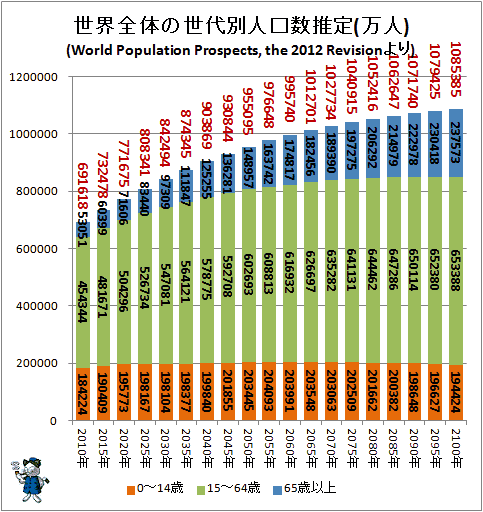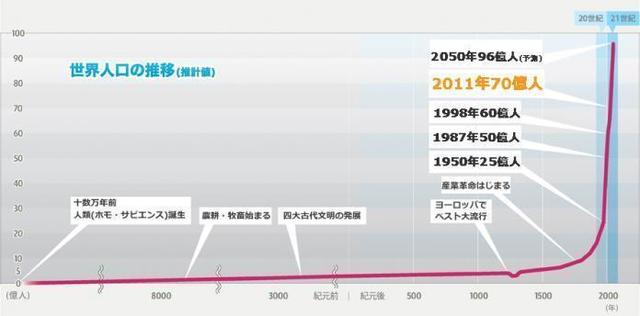1 Sudden cataclysm. Great ruin.
2 Tragic endings such as plays and novels. catastrophe.
3 In theaters, close up.
(From Digital Daisensen)
Currently, the world population is 7,597,770,000 (as of January 1, 2019)
Source: https://www.populationpyramid.net/ja/%E4%B8%96%E7%95%8C/2018/
(At the time of article publication, the world's population is 7,258,710,000 (May 31, 2015))
An Essay on the Principle of Population (calculating the number of populations that can be assumed on the earth in the future)
Germany's Albrecht Penck states that the total number of humans (Z) is calculated by multiplying the average land-based production (P) by the total land area (L), then dividing each person's average food demand (n). Invented when calculated. Z = LP / n is called Penck's basic formula. Penck uses Köppen's climate classification to calculate the maximum tolerable population on Earth at 15.904 billion. The ideal population was calculated to be 7.689 billion.
Fisher estimates that the available population per political block is 6 billion.
Holstein divides the world into nearly forty agricultural areas, calculates land reclamation days, taking into account land valuation and human calories, and assuming 13.29 billion people.
However
Limit of growth
Published in 1972, the Rome Club focused on resources and the finite nature of the earth, commissioned by an international team led by Dennis Meadows of the Massachusetts Institute of Technology, and compiled using system dynamics methods. . "If current trends such as population growth and environmental pollution continue, growth on earth will reach its limits within 100 years," he warned.
As a famous sentence
People increase geometrically, but food only increases arithmetically
Considering this in chronological order, `` People can be produced only once a year in a certain land, while people multiply by multiplication because a child is born and that child has another child. Is based on the concept of becoming "addition"
This is a quotation from Population Theory, a classic work of demography by Thomas Robert Malthus.
Population principle
First, Malthus begins by making two basic self-evident assumptions.
First, food (living resources) is necessary for human survival.
Second, there is always lust for the opposite sex.
A consideration derived from these two assumptions is that Malthus asserts that population growth is unequally greater than the capacity of land to produce living resources, and that if the population is not restricted, it will increase exponentially, but living resources will increase. It shows the proposition that it only increases arithmetically.
Malthus envisions the following imbalances in population and living resources: Suppose an island country has a population of about 7 million, and there are enough living resources to produce this population. Every 25 years, the population increases geometrically to 14 million, 28 million, and 56 million, but food only increases to 14 million, 21 million, and 28 million in arithmetic. By the end of the century, there would be an imbalance of 115 million people and 35 million living resources. This debate can be applied to the whole planet.Assuming that the world population is 1 billion and the living resources are sufficient, the ratio of population to living resources in 225 years will be 512: It becomes 10 and expands to 4096 to 13 in the third century.

World Population Prospects, updated regularly by the Population Department of the United Nations Secretariat, Economic and Social Affairs Bureau (2012 edition)

Published by the United Nations Population Fund Tokyo Office “Changes in world population from the birth of humanity to 2050 (estimated value) graph”
What is coming is a catastrophe that humanity has never experienced.
Source: http://proposition.seesaa.net/article/463685287.html
A cunning dictator uses any hand to protect himself.